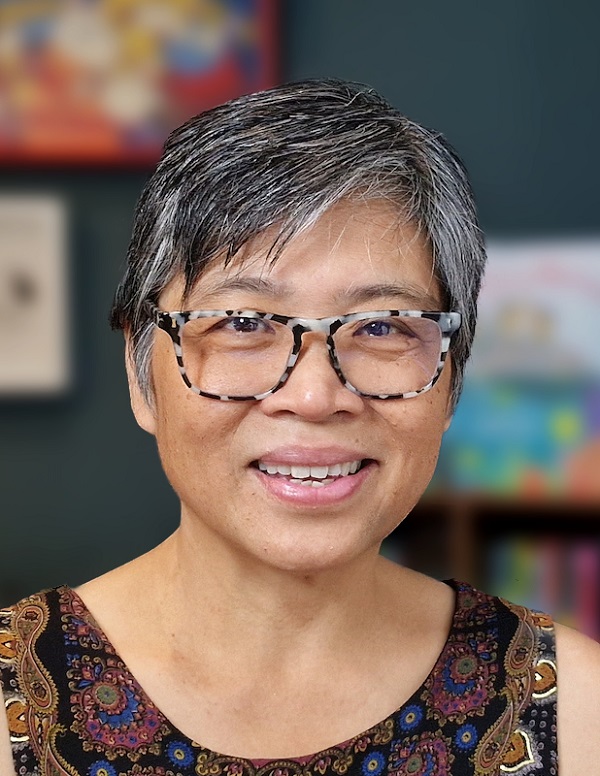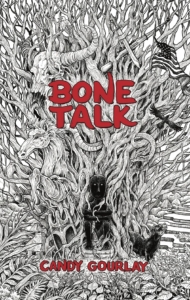
Authorgraph No.259: Candy Gourlay
Candy Gourlay interviewed by Andrea Reece
‘The creative process always begins with a question’, says Candy Gourlay as we talk on Zoom about her new book, Wild Song, a vivid, evocative historical adventure story and the follow up – though in fact originally planned to be out first – to her Costa Children’s Book Award shortlisted novel Bone Talk. And the question at this book’s heart: ‘What does it mean to be civilised?’
 A former journalist, Candy Gourlay writes in prose that is both accessible and profound, the compassion she feels for the people whose stories she is telling shining out. Now based in London, she sets her books in her homeland, the Philippines, her debut Tall Story still prompting letters to this day from children there saying it’s the first book they’ve read to feature Filipino characters like them. Wild Song’s long journey to publication – we’ll find out just how long – began when she came across a photograph of a young Igorot boy dancing the ‘cakewalk’ with a white woman, who is dressed in full Edwardian finery, at the World’s Fair in Saint Louis, in 1904. The Igorot people come from the mountains of Luzon, the largest island in the Philippines. Intrigued, Candy started to research the Fair and ‘it was amazing!’ she says. ‘The hot dog was invented there, as well as the ice cream cone and the first baby incubator. Edison designed the lighting for the Fair…’. Inspired and intrigued, she began writing a book for middle grade readers from the point of view of a young Filipino boy at the Fair who witnesses the invention of the hot dog. It was set to be funny and heart-warming, but as she researched the Fair in depth, her plan changed. ‘I only had to read a tiny bit to see that I didn’t understand the World’s Fair at all.’
A former journalist, Candy Gourlay writes in prose that is both accessible and profound, the compassion she feels for the people whose stories she is telling shining out. Now based in London, she sets her books in her homeland, the Philippines, her debut Tall Story still prompting letters to this day from children there saying it’s the first book they’ve read to feature Filipino characters like them. Wild Song’s long journey to publication – we’ll find out just how long – began when she came across a photograph of a young Igorot boy dancing the ‘cakewalk’ with a white woman, who is dressed in full Edwardian finery, at the World’s Fair in Saint Louis, in 1904. The Igorot people come from the mountains of Luzon, the largest island in the Philippines. Intrigued, Candy started to research the Fair and ‘it was amazing!’ she says. ‘The hot dog was invented there, as well as the ice cream cone and the first baby incubator. Edison designed the lighting for the Fair…’. Inspired and intrigued, she began writing a book for middle grade readers from the point of view of a young Filipino boy at the Fair who witnesses the invention of the hot dog. It was set to be funny and heart-warming, but as she researched the Fair in depth, her plan changed. ‘I only had to read a tiny bit to see that I didn’t understand the World’s Fair at all.’
The Saint Louis World’s Fair came just after the end of the Philippine-American war – or, as the US called it, the Philippine Insurgency – which had raged in the Philippines from 1899 – 1902, though in fact skirmishes and rebellions continued long after that. The war was not popular with the American people and, to justify it, President McKinley claimed that the Philippines needed to be ‘civilised’, forgetting the inconvenient fact that under the Spanish, Filipinos had been Christians for three hundred years. The discovery of the indigenous Igorot – and their subsequent appearance on the cover of National Geographic – created huge interest and allowed that line to be promoted, and a group of Igorot were brought to Saint Louis to take part in the Fair. Their experiences form the basis of Wild Song. Before  Candy could write the book however, there were more questions: ‘Everyone would have known people who had died during the war, and I wanted to know what the Igorot were doing there; whether they were really happy to be there.’ This was the time of the rise of #OwnVoices says Candy and, ‘I was very aware that the Igorot are not my tribe. I couldn’t just write about them without learning much more.’ She began to research them, and that led to her writing Bone Talk, ‘the way in to understanding their culture and to my understanding of the war.’ It took her five years to research and write Bone Talk, another five to research and write Wild Song.
Candy could write the book however, there were more questions: ‘Everyone would have known people who had died during the war, and I wanted to know what the Igorot were doing there; whether they were really happy to be there.’ This was the time of the rise of #OwnVoices says Candy and, ‘I was very aware that the Igorot are not my tribe. I couldn’t just write about them without learning much more.’ She began to research them, and that led to her writing Bone Talk, ‘the way in to understanding their culture and to my understanding of the war.’ It took her five years to research and write Bone Talk, another five to research and write Wild Song.
What her research revealed was a very spiritual people with a complex society structure. She had three main sources: a book on the Bontok Igorot written by a man called Albert Jenks, ‘very detailed on how they lived, what the houses were like’ says Candy, but somewhat like ‘a zoological study’. Later she discovered that it was in fact Jenks who was responsible for bringing the Igorot to the World’s Fair. Then there are the diaries of Albert’s wife, Maud, who stayed behind with the Bontok people while her husband went on his expeditions, and which do a better job of conveying a sense of what they were really like, of their own voices. This is true too of the books of William Henry Scott, still respected in the Philippines today, who tried his hardest to record the voices of the Bontok people, a ‘very useful, very sensitive record’ says Candy.
Bone Talk describes the arrival of US soldiers in Bontok territory, and the impact they have. They are cruel and violent, deceive the Igorot and regard them as ‘savages’, as they were often described in the writing of the time, though the soldiers’ own behaviour is far less ‘civilised’. Despite this, in Wild Song, the heroes of Bone Talk, Samkad and his best friend Luki, accept the invitation to travel to Saint Louis. In fact the real driver for their trip is Luki, a character readers already love, fierce, independent, not afraid to leave, but rather afraid of how her life would be constrained by staying at home.
Their trip entails traveling to Manila, crossing the Pacific and then continuing by train from Tacoma to finally arrive in Saint Louis, where they have to build their own Igorot Village and then live in it for the entertainment of visitors. They encounter a great deal of racism, from the train conductor who chose not to turn on the heating for the ‘savages’ in freezing temperatures, resulting in the death from pneumonia of two of the party, to the professor who preserves the brains of dead indigenous people to study. Luki also witnesses racism against her friend Johnny, a Filipino Constabulary soldier. Yet, as Candy points out, this was the Progressive Era in the US, when people were becoming conscious all sorts of things, women’s suffrage, workers’ rights, environmental protection, even animal rights. It was ‘America trying to be good’, says Candy, yet despite the growing awareness of human rights, Native Americans were excluded from them and the backlash from the civil war was at its fiercest. She talks about Mark Twain, ‘who was my hero and admired in the Philippines for being on our side during the Philippine America war’, who not only wrote fiction that was anti-Native American but essays on the subject too. ‘It makes me think about what we are aware of that we also choose to ignore’, she says.
Luki and Samkad choose to return to their village in the Luzon mountains, shedding their American clothes on the boat back, Luki putting on again her Bontok skirt and top, Samkad his loincloth, and their homecoming is a joyful one. Kinyo, who also appears in Bone Talk, chooses to stay however. ‘Kinyo is based on a real life character called Antero,’ says Candy. Antero was a servant to Albert Jenks and his translator. He remained in America after the World’s Fair, travelled widely there, and later appeared as part of an attraction at Coney Island. ‘Kinyo is a complex character who made his own decisions’, says Candy. ‘For me he represents all the Filipinos who were enticed by and fell in love with American culture, which is very lovable. I bought into it myself – I grew up with Sesame Street, speaking English like an American, my mother remembers watching movies every morning, the joy of them. It wasn’t until I started this research that the gravity of what they did to us hit home.’ She quotes Philippine author Gina Apostol, ‘forgetting is an aspect of genocide’.
We return to the question that prompted the book, and what it means to be civilised. ‘The more I read about the Igorot, the clearer it is that their society was very ordered, very civilised. That they were very spiritual, and that in fact the Americans were able to use that spirituality to infiltrate their society. But when you compare the Americans and the Igorot, what happened and what they did, to be civilised is to be able to look at someone who is not like you and be able to see their humanity. No matter how often the Americans describe the Igorot as savages, the more civilised society was always the Igorot.’
‘I put my heart and soul into this book,’ she concludes, ‘and I think it’s the most important I’ve ever written. The story of the Igorot is my story, this is what happened to Filipinos, we all need to understand what happened to us. Knowing who you are enriches you, and it’s empowering to know the truth.’
Andrea Reece is Managing Editor of Books for Keeps.
Bone Talk and Wild Song are published by David Fickling Books, £7.99 pbk and £12.99 hbk respectively.





